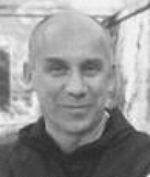The Fall
by Thomas MertonOriginal Language English
There is no where in you a paradise that is no place and there
You do not enter except without a story.
To enter there is to become unnameable.
Whoever is nowhere is nobody, and therefore cannot exist except as unborn:
No disguise will avail him anything
Such a one is neither lost nor found.
But he who has an address is lost.
They fall, they fall into apartments and are securely established!
They find themselves in streets. They are licensed
To proceed from place to place
They now know their own names
They can name several friends and know
Their own telephones must some time ring.
If all telephones ring at once, if all names are shouted at once and all cars crash at one crossing:
If all cities explode and fly away in dust
Yet identities refuse to be lost. There is a name and a number for everyone.
There is a definite place for bodies, there are pigeon holes for ashes:
Such security can business buy!
Who would dare to go nameless in so secure a universe?
Yet, to tell the truth, only the nameless are at home in it.
They bear with them in the center of nowhere the unborn flower of nothing:
This is the paradise tree. It must remain unseen until words end and arguments are silent.
| -- from Selected Poems of Thomas Merton, by Thomas Merton |
<<Previous Poem | More Poems by Thomas Merton | Next Poem >>
View All Poems by Thomas Merton
What does Merton mean when he talks about being "nameless" and "unnameable"?
To be "nameless" is a state experienced by many deep mystics, and it is particularly emphasized in nondualist traditions, like Zen. In ecstatic communion, the mind subsides so completely that the ego, the "I"-sense, thins or fades out completely. The bliss that results is a profound awareness of witnessing life everywhere, but with no "me," no witness. You could say that there is still a point of perception, but no perceiver.
This radical state is the loss of your name. How can you have a name when there is no "you" there? What is there to be named? A name is a reference to an object with an identifiable form -- but you have become formless, unnamable! A chair is named a "chair" only so long as it has the form of a chair; but if the object flowed naturally through all possible patterns and forms without stopping on one shape, could you still call it a chair? Of course not. It has lost its identity with a single form, it has lost its "apartment," its fixed address, and therefore cannot be named.
Yet, surprisingly, it is the "nameless who are at home" in the universe. In identifying with a single and limited sense of "me," the little self rejects the vast majority of existence. Through being nameless, we find all things within ourselves. There is no other way to be at home in the universe.
Having no "apartment" that the ego can call home, we find "the center of nowhere" within ourselves. Having no fixed "me" with a start and an end, we become the "unborn flower of nothing" -- that is, unborn and not trapped by thing-ness.
Often this sort of description sounds rather bleak or negative, but it is not. It is a source of indescribable joy and freedom. It is truly the "paradise tree." In settling into this state, the "world" -- the experience of the exterior environment as separate, an agitated projection of the ego -- stops or "ends." Perception continues -- it is enhanced! -- but it is no longer of an exterior world; everything is seen as being within, a part of one's Self. This is only truly known, however, when the mind settles, when "words end and arguments are silent."
Much to meditate on in this poem...
Recommended Books: Thomas Merton
| Selected Poems of Thomas Merton | The Collected Poems of Thomas Merton | A Thomas Merton Reader | The Strange Islands: Poems by Thomas Merton | Thomas Merton Monk & Poet: A Critical Study |

